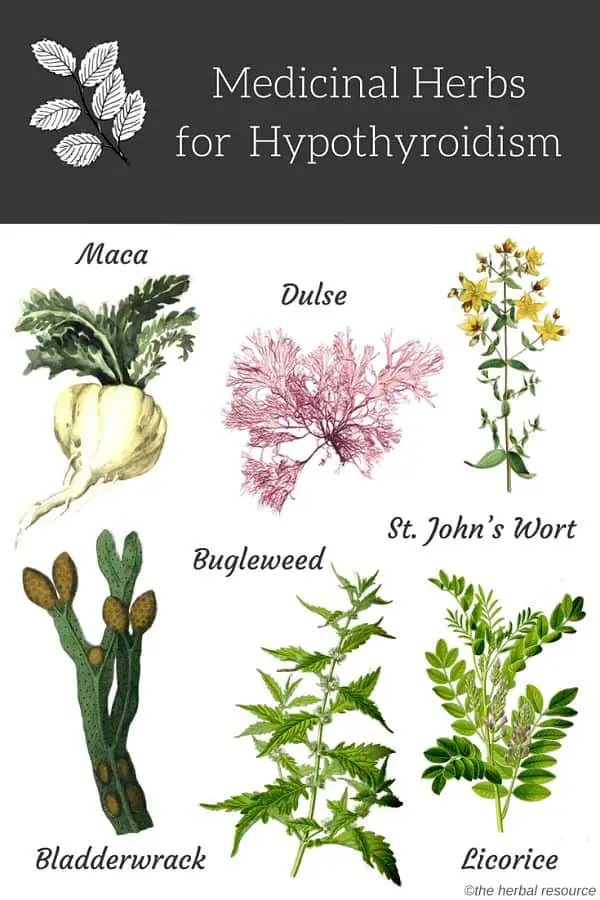The thyroid hormone is responsible for controlling the body’s metabolism. When the body lacks sufficient thyroid hormone because it is blocked, it is called hypothyroidism and it affects millions of people around the world.
Thyroid problems are a serious concern, whether it is hyperactive, or hypoactive.
For a hypoactive thyroid, iodine is the most common form of treatment in modern medicine, and that same trait carries over into herbal remedies as well, as many medicinal herbs are high in iodine.
As with any serious medical condition, herbal remedies for hypothyroidism will not always be the optimum solution and should be used in conjunction with medical treatment, not as a replacement for it.
Choosing one or more medicinal herbs as a natural remedy for hypothyroidism can be a beneficial addition to the traditional medicine and might prove to be a more symptom-free approach but before taking any herbal remedies, it is important to get acquainted with the possible side effects that may be associated with them.
Medicinal Herbs for Hypothyroidism
Maca (Lepidium meyenii)
Maca is considered a natural remedy for hypothyroidism. It contains alkaloids that are believed to stimulate both the pituitary gland and hypothalamus.
Research is currently underway to determine how maca as a treatment for hypothyroidism can be integrated into modern medicine as a possible alternative to surgery.
St. John’s Wort (Hypericum perforatum)
Since depression is often a symptom of hypothyroidism, a natural treatment for depression such as St. John’s Wort may benefit hypothyroid patients by decreasing depression.
St. John’s Wort contains a monoamine oxidase or a MAO inhibitor which naturally suppresses depression and assists in elevating the mood.
Dulse (Palmaria palmata)
Dulse is a red alga (Rhodophyta), rich in protein and naturally containing iodine. Dulse can be found in the cold waters of the Northwest Pacific Oceans and the Atlantic.
It is used as an herbal medicine for thyroid problems largely in part because it contains [easyazon_link identifier=”B000158HGI” locale=”US” tag=”herbal-resource-20″]iodine[/easyazon_link], shown to be beneficial in medicinally treating thyroid conditions.
Bladderwrack or Kelp (Fucus vesiculosus)
This seaweed is common in northern coastal locations in North America and Europe. It is unusually high in iodine, which is a primary chemical involved in proper thyroid function.
In addition to its herbal use for hypothyroidism, the seaweed is also harvested and processed for the treatment of goiter.
Bugleweed (Lycopus europaeus)
Some research studies seem to support the use of bugleweed as a herb for the treatment of hypothyroidism and it has long been used by herbal practitioners to normalize chemical balance in super active thyroid glands.
Bugleweed contains lithospermic acid which is believed to decrease the thyroid hormone thyroxine.
Licorice (Glycyrrhiza glabra)
Licorice contains a number of verified anti-oxidants and is reportedly effective in maintaining the endocrine system.
Other chemicals found in this herb are thought to be particularly well suited for healing and maintaining the hypothalamus, and pituitary and adrenal glands.
Coleus (Coleus forskohlii)
Coleus forskohlii, a member of the mint family, is thought to stimulate thyroid functioning by increasing thyroid hormone production.
In tincture form, it should be taken in increments of one to two milliliters three times a day to be effective. ‘
Coleus forskohlii grows in subtropical areas like India, Burma, and Thailand and has been shown effective in weight loss, psoriasis, and glaucoma, in addition to its thyroid stimulating characteristics.
Other natural herbs that have been used for hypothyroidism treatment.
- Black Cohosh – (Cimicifuga racemosa)
- Cayenne – (Capsicum annum)
- Irish moss – NB: The seaweed (Chondrus crispus)
- Gentian – (Gentiana lutea)
- Radish – (Raphanus sativus)
- Mustard – (Brassica nigra)
- Lemon balm – (Melissa officinalis)
- Hawthorne – (Crataegus oxycantha)
- Alfalfa – (Medicago sativa)
Thordur Sturluson
Latest posts by Thordur Sturluson (see all)
- What is the Difference Between Hemp and Marijuana? - June 3, 2019

Leave a Reply